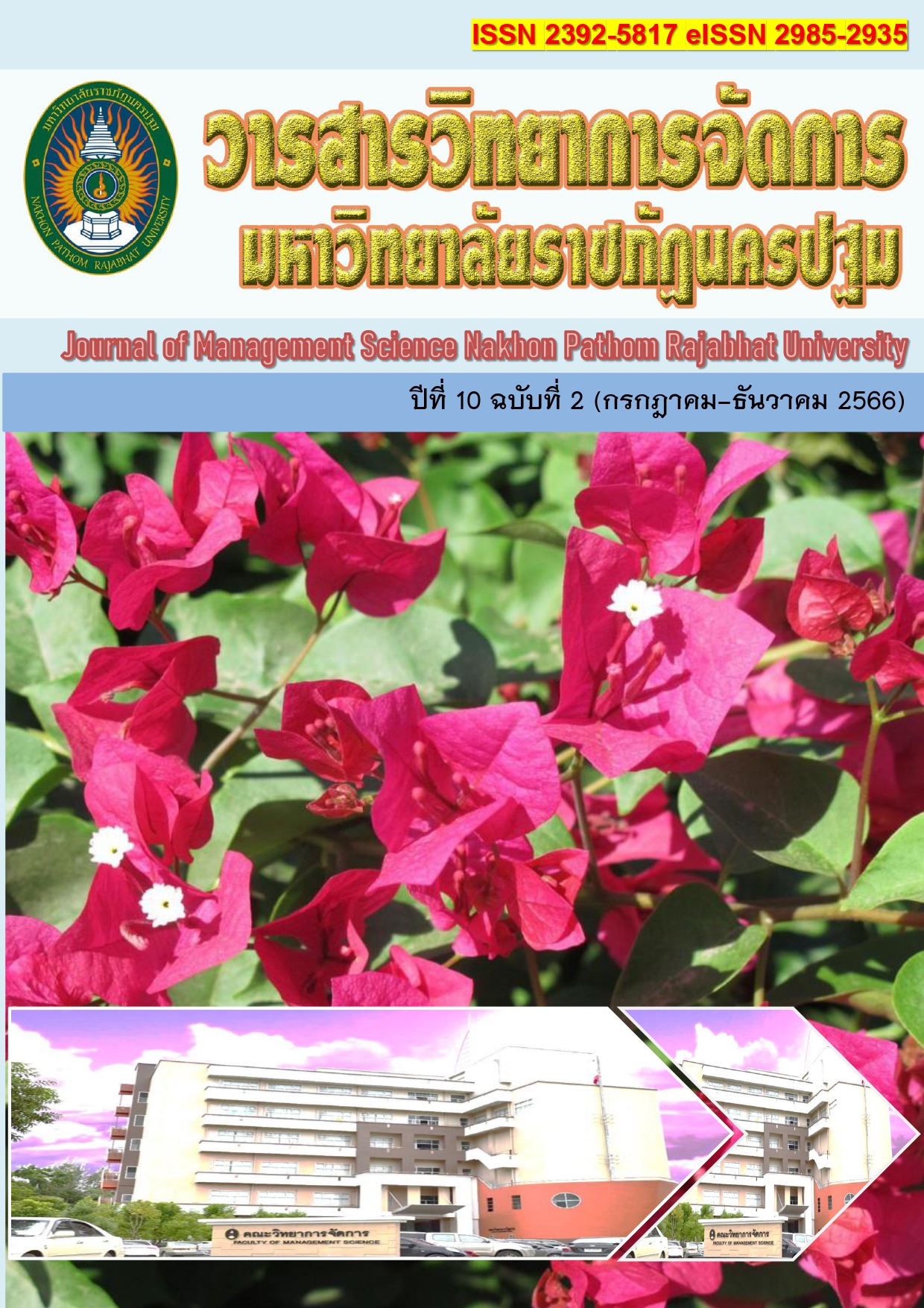Effectiveness of Tourism Management of Phuket Province
Main Article Content
Abstract
The objectives of this research were 1) to study the management and effectiveness of tourism management in Phuket province 2) to study the factors of tourism management that correlated with the tourism management effectiveness in Phuket province, and 3) to study guidelines for the development of tourism management in Phuket. The research model is qualitative research. 20 key informants were selected by purposive sampling. Use in-depth interviews. These key informants were: 4representatives from local organizations, 4 representatives from tourism agencies, 4 representatives from tour entrepreneur, 4 local people and 4 experts in tourism management and public administration academics. The study tool was structured interviews. The answer to the required information is degrading, non-participatory observation and in-depth interviews and analyze the collected data by descriptive description.
Research results (1) Management conditions and effectiveness of tourism management in Phuket province, it was found that the tourism management in Phuket Province can be managed effectively (2) the tourism management factors related to the tourism management effectiveness in Phuket province and all factors contributed to the tourism management in Phuket Province. (3) guidelines for the development of tourism management in Phuket Province. The tourism program in Phuket can be done by linking many tourist attractions together should be organized in a variety in accordance with the needs of tourists and the organization of creative tourism programs to attract or persuade tourists, especially those with specific interests. Access to tourist attractions in Phuket can be done by responsible agencies that must integrate between entrepreneurs, communities, and local government organizations. Facilitate to access the resources of tourist attraction there should be a system to connect tourism between localities, provinces, and provincial groups. Access to tourist attractions must be of a standard and at a price that tourists are able to pay. Phuket attraction development can be done by presenting a distinctive identity and culture, world-class tourist attractions including cultural diversity. Arranging activities to complement travel time by creating activities during the trip when the distance between each tourist attraction if very far apart. The development of the management of tourism facilities in Phuket. This can be done by planning and implementing the development of facilities, directional and participatory tourist area and give importance to the provision of complete and modern facilities.
Article history: Received 1 June 2023
Revised 25 June 2023
Accepted 26 June 2023
SIMILARITY INDEX = 4.64 %
Article Details

This work is licensed under a Creative Commons Attribution-NonCommercial-NoDerivatives 4.0 International License.
The views and opinions of the article appearing in this journal are those of the author. It is not considered a view and responsibility of the editorial staff.
References
กฤษณะ ถวิลวงษ์. (2559). การบริหารจัดการการท่องเที่ยวเพื่อการอนุรักษ์วัฒนธรรมและทำนุบำรุง พระพุทธศาสนา กรณีศึกษาโรงแรมธรรมะ (Temple stay) ของวัดภูเก็ตและชุมชนรอบวัด. รัฐศาสตรมหาบัณฑิต (บริหารรัฐกิจและกิจการสาธารณะ) สาขาวิชาบริหารรัฐกิจ และกิจการสาธารณะ สำหรับนักบริหาร, คณะรัฐศาสตร์ มหาวิทยาลัยธรรมศาสตร์.
กองเศรษฐกิจการท่องเที่ยวและกีฬา สำนักงานปลัดกระทรวงการท่องเที่ยวและกีฬา. (2562). สรุปขีดความ สามารถในการแข่งขันด้านการท่องเที่ยวของไทย ปีพ.ศ. 2562. [ออนไลน์]. ค้นเมื่อ 17 เมษายน
, จาก https://www.mots.go.th/download/article/article_20190925130927.pdf
กิตติศักดิ์ กลิ่นหมื่นไวย. (2561). การศึกษาศักยภาพและสร้างรูปแบบเส้นทางการท่องเที่ยวชุมชนและ มัคคุเทศก์ ท้องถิ่น การท่องเที่ยวชุมชนเทศบาลตำบลนาครัว อำเภอแม่ทะ จังหวัดลำปาง. วารสารวิชาการมหาวิทยาลัยธนบุรี, 12(28), 85-97.
ชาญโชติ ชมพูนุท. (2558). แนวทางการบริหารจัดการการท่องเที่ยว. [ออนไลน์]. ค้นเมื่อ 17 เมษายน 2566, จาก https://www.gotoknow.org/posts/595309
นนทิภัค เพียรโรจน์ สิริภัทร์ โชติช่วง และ ณัฐมน ราชรักษ์. (2558). การเชื่อมโยงเส้นทางและการส่งเสริมการตลาดโปรแกรมการท่องเที่ยวเชิงประวัติศาสตร์และวัฒนธรรมของกลุ่ม 4 จังหวัดในภาคใต้ของประเทศไทย. วารสารวิทยาการจัดการ.32(2), 89-115.
ปัญญา คล้ายเดช ณัทธีร์ ศรีดี ปชาบดี แย้มสุนทร สุภาพร บัวช่วย เนตรทราย แย้มเจริญ และไพทูรย์ มาเมือง. (2563). รูปแบบการบริหารการจัดการการท่องเที่ยวตลาดน้ำที่มีต่อการพัฒนาวิถีชีวิตและวัฒนธรรม
ในประเทศไทย. Journal of Modern Learning Development, 5(3), 200-218.
พระมหาจำนงค์ สิริวณฺโณ. (2563). บทบาทขององค์กรปกครองส่วนท้องถิ่นในการส่งเสริมการท่องเที่ยวชุมชน. วารสารมหาจุฬาคชสาร. 11(1), 1-12.
พิทยา บวรพัฒนา. (2552). ทฤษฎีองค์กรสาธารณะ. กรุงเทพฯ : ศักดิ์โสภา.
รัฐนันท์ พงศ์วิริทธิ์ธรและกัญญากาญจน์ ไซเออร์ส. (2559). แนวทางการพัฒนาการท่องเที่ยวจังหวัดเชียงใหม่ตาม ทัศนะของนักท่องเที่ยวเพื่อความยั่งยืน. วารสารวิชาการมหาวิทยาลัยธนบุรี. 10(22): 61-66.
รัตติยา พรมกัลป์. (2562). ความสัมพันธ์เชิงสาเหตุของแบบจำลองการจัดการท่องเที่ยวโดยชุมชนเชิงสร้างสรรค์ ในจังหวัดนครสวรรค์. ปรัชญาดุษฎีบัณฑิต สาขาวิชารัฐประศาสนศาตร์, มหาวิทยาลัยมหาจุฬาลงกรณราชวิทยาลัย.
สมศักดิ์ ศิริลาภอนันต์. (2563). ประสิทธิผลการขับเคลื่อนยุทธศาสตร์แหล่งท่องเที่ยวตามอัตลักษณ์วิถีไทย ในเขต กรุงเทพมหานคร. วารสารวิทยาการจัดการมหาวิทยาลัยราชภัฎนครปฐม. 7(2), 1-13.
สำนักงานสถิติแห่งชาติ. (2561). สำมะโนประชาการและเคหะ ปี พ.ศ. 2561. [ออนไลน์]. ค้นเมื่อ 17
เมษายน 2566, จาก http://statbbi.nso.go.th/staticreport/page/ sector/th/01.aspx
สำนักงานสภาพัฒนาการเศรษฐกิจและสังคมแห่งชาติ. (2560). แผนแม่บทภายใต้ยุทธศาสตร์ชาติ (5)
ประเด็น การท่องเที่ยว (พ.ศ. 2561 -2580). [ออนไลน์]. ค้นเมื่อ 17 เมษายน 2566, จาก http://nscr.nesdb.go.th/ wp-content/uploads/2019/04/05-การท่องเที่ยว.pdf
อารยา จันทร์สกุล. (2561). Overtourism ผลกระทบและแนวทางการจัดการเพื่อความยั่งยืน. [ออนไลน์].
ค้นเมื่อ 17 เมษายน 2566 จาก https://www.bot.or.th/Thai/MonetaryPolicy/Southern/
ReasearchPaper/Overtourism.pdf
เอกชัย ชำนินา. (2562). การเพิ่มขีดความสามารถในการแข่งขันด้านการท่องเที่ยวของจังหวัดภูเก็ต. วารสารมหาจุฬานาครทรรศน, 6(5), 2651-2670.
เอกชัย ชำนินา. (2563). การจัดการความปลอดภัยการท่องเที่ยวในจังหวัดภูเก็ต. วารสารมหาจุฬานาครทรรศน, 7(8), 174-189.
Buhalis, D. (2000). Marketing the competitive destination in the future. Tourism Management. 21 (1): 97-116.
Donaldson, R. (2007). Tourism in Small Town South Africa. In Rogerson, C.M. & Visser, G.
(eds). Urban Tourism in the Developing World: New Jersey: The South African Experience.
Pike, Steven D. (2008). Destination Marketing: an integrated marketing communication approach. Butterworth-Heinmann, Burlington, MA.


